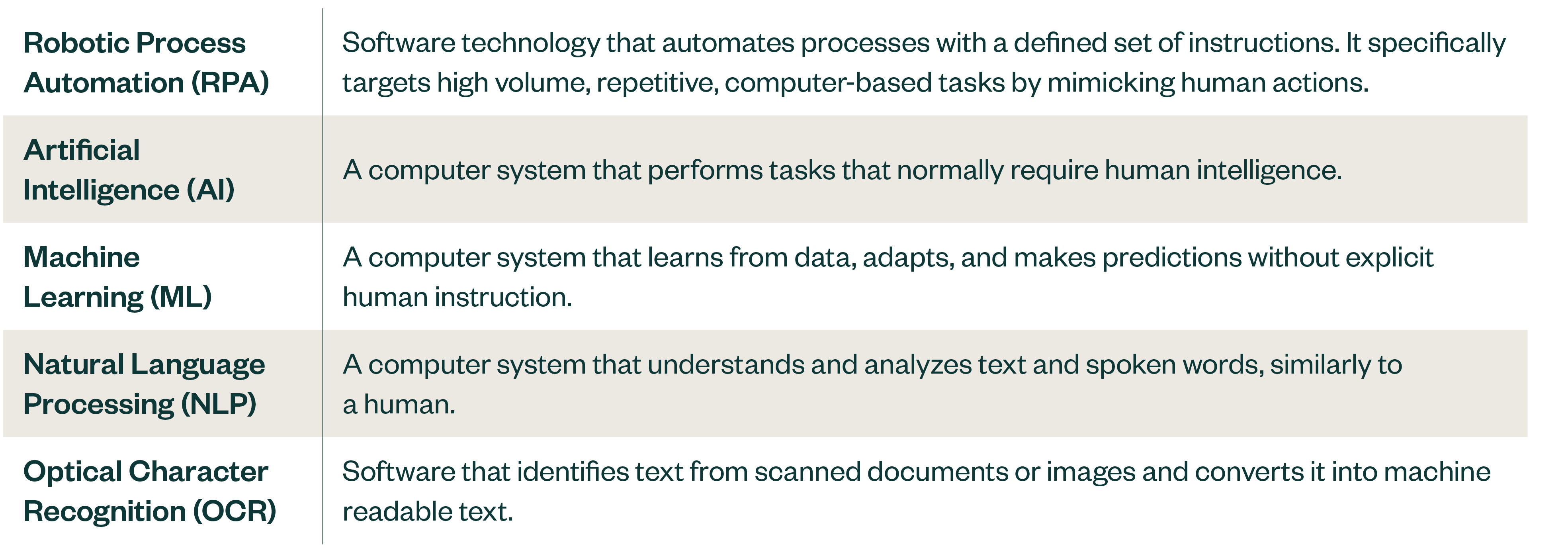
There’s a lot of news highlighting artificial intelligence (AI) technology, but it can be challenging to identify exactly how AI can be used to benefit the needs of your business.
One area AI can make an impact within an organization is through intelligent automation processes. Intelligent automation can be applied to highly manual business processes to help:
- Alleviate current pain points
- Create greater process efficiencies
- Reduce errors
- Allow employees to focus on crucial work that impacts your bottom line
What Is Intelligent Automation?
Intelligent automation is the combination of robotic process automation (RPA) with AI and other related technologies. By combining the capabilities of RPA with AI, users can elevate their automation efforts through implementing more end-to-end automation versus only automating simple rule-based tasks.
How Does Intelligent Automation Work?
Intelligent automation utilizes a collection of technologies that work in tandem to automate processes.

What Is Hyperautomation?
Hyperautomation refers to the use of multiple technologies, tools, or platforms to automate business processes.
Intelligent automation is often used within hyperautomation efforts to achieve automation beyond simple rule-based tasks using:
- Low code platforms
- Packaged software
- Other process automation tools
It’s often used as an approach to using different toolsets to achieve automation goals.
What Are Benefits of Intelligent Automation?
By combining RPA with AI, users can use these technologies to automate end-to-end business processes. Without the use of AI, automation can be limited to more simple tasks that have very defined business rules that can easily be mapped out.
By utilizing intelligent automation, users can automate more complex business processes and work with semi-structured and unstructured data that may have previously required human intervention to help them achieve greater process efficiency.
How Can Your Organization Use Intelligent Automation?
Intelligent automation can be applied to a wide range of processes. Examples of processes that are good candidates for intelligent automation include:
- Sales order processing
- Invoice processing
- Fraud detection
- Predictive analytics
- Capturing and processing semi-structured and unstructured data from various data sources
Each of these processes present complexities that can’t be addressed by RPA alone. However, by utilizing AI and other related technologies such as OCR and ML, these processes can be automated.
Intelligent Automation Tools
Intelligent automation isn’t a stand-alone tool, but rather a collection of technologies to assist with more end-to-end automation. Intelligent automation technologies are being incorporated into many different automation tools, such as low code RPA and other process automation platforms, like analytic process automation (APA).
These platforms include the ability to utilize these different technologies within a single platform by incorporating out-of-the-box features that can be utilized in your automations.
We’re Here to Help
For guidance on intelligent automation considerations for your organization, contact your Moss Adams professional. You can also visit our Automation Services for additional resources.